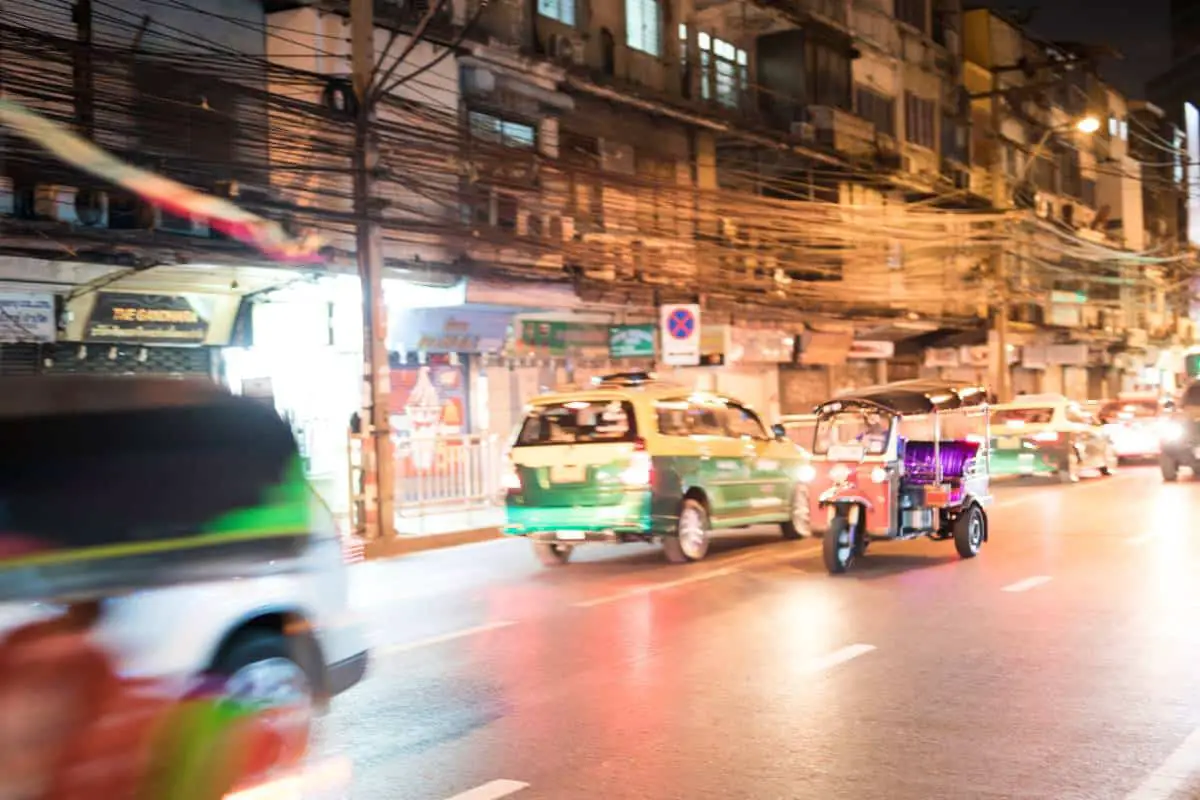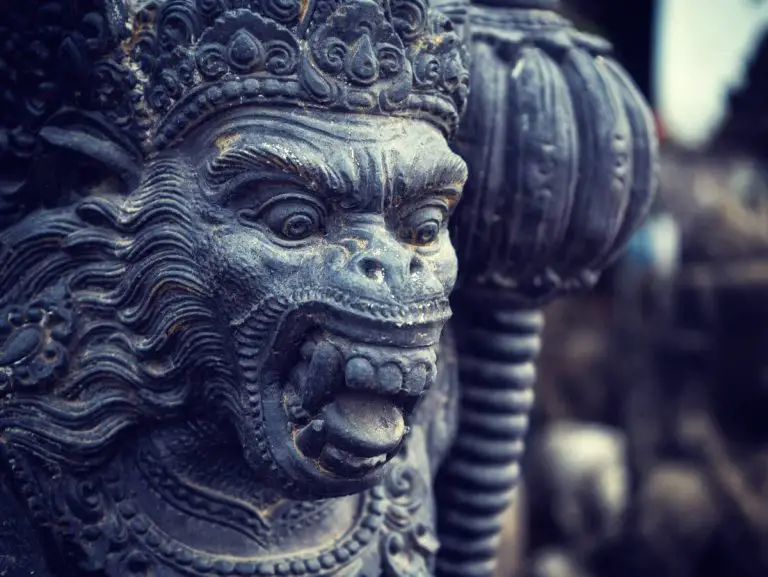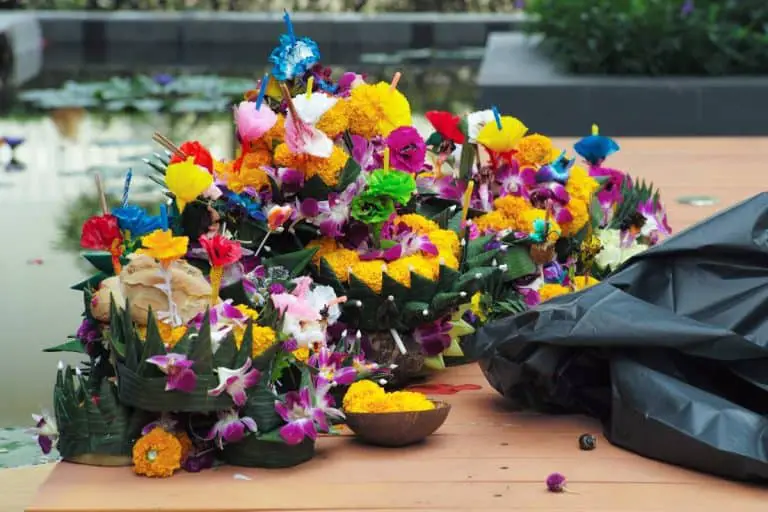Thai Taxi Meter Rules: Guide To Fair Meter Taxi Fares In Thailand
Navigating Thailand’s vibrant Thai taxi meter rules can feel overwhelming, especially when you’re unsure about the rules governing meter usage versus fixed pricing. Whether you’re stepping off the plane at Suvarnabhumi Airport or exploring the bustling streets of Bangkok, understanding Thai taxi meter regulations will save you money and reduce travel stress.
Key Takeaways
- Meter use is mandatory by law – Thai taxi drivers are legally required to use meters within city limits, with violations subject to penalties.
- Fixed pricing is common at tourist areas – Hotels and attractions often feature drivers who refuse meters, but moving taxis typically comply.
- Know the current fare structure – Rates start at 35 baht with distance-based increases, plus traffic surcharges and airport fees.
Thai Taxi Meter Regulations
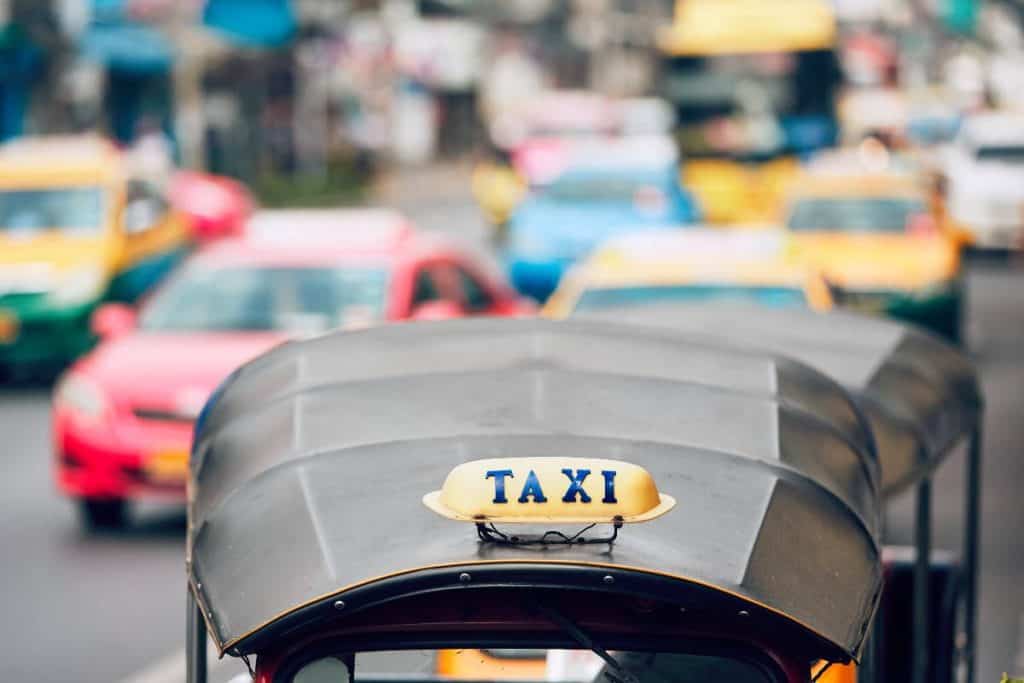
Cities or districts officially set taxi tariffs in Thailand. The taxi tariff in Bangkok was last set in January 2023 and published in the official tariff ordinance. It is binding for all taxis and taxi companies within the compulsory driving area and may not be exceeded or undercut. This is ensured by officially calibrated taximeters installed in the taxis.
The legal framework is crystal clear: taxi drivers must use their meters when operating within designated city boundaries. There is a law in Thailand that requires taxis to always run on meters and not to decline any customer who hails them when they are available. The government has opened a hotline (1584) for customers to report complaints against uncooperative taxi drivers.
However, the reality on the ground often differs from the regulations. Many drivers, particularly those stationed outside hotels, shopping malls, and tourist attractions, will attempt to negotiate fixed fares instead of using their meters.
Current Bangkok Taxi Fare Structure
The metered taxi system operates on a tiered pricing model that’s quite reasonable by international standards. Here’s how the current fare structure works:
Base Fare and Distance Rates:
- 35 THB is a starting taxi fare in Bangkok, so you should see it on the meter at the start of your journey, and for this price, you can travel up to 1 km. For the distance from 1 km to 10 km, the taxi meter price is set at 6.50 THB per km (was 5.50 THB/km).
- Distance 10-20 km: 7.00 THB per kilometer
- Beyond 20 km: Higher rates apply
Traffic Surcharges: As traffic conditions in the Thai capital are complicated and traffic jams are the norm, for every minute the taxi cannot move by more than 6 km/h speed, you will have to pay an extra fare of 3 THB per minute (was 2 THB/minute). This waiting time charge is completely legitimate and reflects the reality of Bangkok’s notorious traffic congestion.
Additional Fees and Surcharges:
- Airport pickup: 50-70 THB surcharge (depending on vehicle type)
- Radio booking: 20 THB surcharge
- Grab app booking: 20 THB surcharge
- Expressway tolls: 25-70 THB (passenger responsibility)
When Fixed Pricing Becomes the Norm
While meter usage is legally mandated, certain situations commonly involve fixed pricing negotiations:
Tourist Area Dynamics
Some tourists complain that drivers refuse to switch on the meter, or the driver says that the meter is ‘broken’. These are invariably the taxis parked up outside tourist attractions and hotels. The driver will usually try to negotiate a fixed fare rather than use the meter.
The drivers stationed at premium locations often operate under different economic pressures. They pay higher fees for prime positioning and cater to tourists who may be unfamiliar with local meter rates.
Island and Remote Destinations
Also, cabs typically don’t use meters on islands. Otherwise, only use a taxi that uses a meter. In destinations like Phuket, Koh Samui, or other island locations, fixed pricing becomes the standard rather than the exception.
Long-Distance Travel
For journeys extending beyond normal city limits or to airports, many drivers prefer negotiating fixed rates. This practice, while not strictly legal within metered zones, often provides mutual benefit by avoiding traffic-related meter escalation.
Strategies for Ensuring Meter Usage
The Moving Taxi Advantage
If you don’t want to do that, the answer is simple: flag down a moving cab. If a cab is parked up outside a tourist attraction or hotel and the driver asks you where you want to go, you are almost certainly going to pay over the odds for that journey.
Moving taxis represent your best opportunity for meter compliance. These drivers are actively seeking fares and are more likely to accept standard metered trips without negotiation.
Identification and Verification
Before entering any taxi, verify that it’s operating legally:
- Look for the illuminated red sign in the front window showing availability
- Check for a visible taxi meter on the dashboard
- Ensure the driver displays proper identification
- Note the vehicle’s registration and taxi ID numbers
Recent incidents highlight the importance of these checks. The situation escalated when the passenger asked to see the driver’s licence or public transport ID, only to be told there were no documents available. The driver said the vehicle’s registration had expired.
Communication Strategies
Language barriers can complicate meter requests, but simple gestures work effectively. Point directly at the meter before the journey begins and say “meter” in English, which is widely understood by most drivers. You can also show the universal gesture of turning something on by making a twisting motion with your hand. Having your destination written in Thai script eliminates confusion and ensures you reach the right location without unnecessary detours.
Understanding Traffic and Route Dynamics
Traffic Surcharge Logic
The traffic surcharge system reflects Bangkok’s challenging driving conditions. When vehicles move slower than 6 km/h, the additional 3 baht per minute charge compensates drivers for extended journey times. This system ensures fair compensation while maintaining reasonable base rates.
Route Selection and Expressways
Experienced taxi drivers often suggest expressway routes to avoid surface street congestion. While tolls add to your total cost, the time savings and predictable pricing often justify the expense. Expressway charges vary from around 25 to 45 Baht. For example, travelling from Bangkok Suvarnabhumi airport into the Sukhumvit area of the city would incur two expressway charges: 45 Baht and 25 Baht. You are responsible for this fee.
Alternative Transportation Options
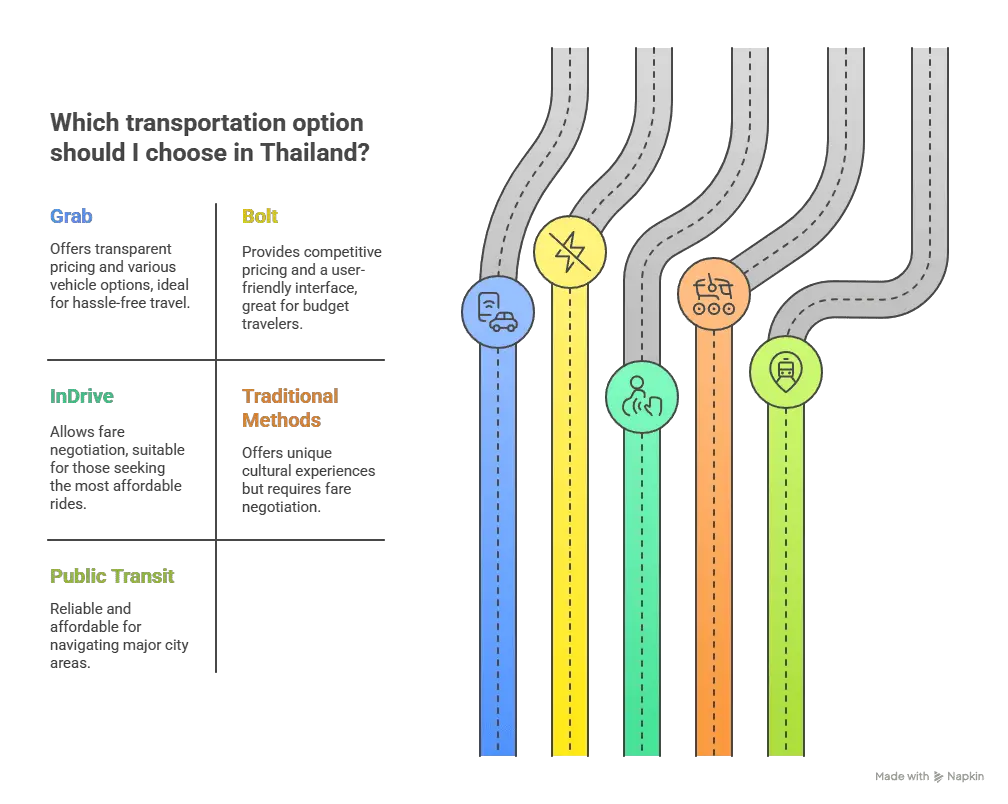
Grab: The Dominant Player
Grab stands as Thailand’s most popular ride-sharing platform, offering transparent pricing that eliminates the need for meter disputes. The app provides various vehicle types, including standard cars, motorcycles, and luxury options, with upfront pricing displayed before booking. You can pay using multiple methods, including cash, credit cards, or the integrated GrabPay system. This comprehensive approach makes Grab particularly appealing to tourists who want predictable fares without negotiation hassles.
Bolt: Competitive Alternative
Bolt operates in major Thai cities with a competitive pricing structure that often undercuts Grab’s rates. The platform offers similar vehicle options, including cars, vans, and motorcycles, with a user-friendly interface that’s easy to navigate. While Bolt has fewer drivers than Grab in some areas, it provides excellent value for money. The app works seamlessly with international phone numbers, making it accessible for travelers.
InDrive: Negotiation-Based Platform
InDrive takes a unique approach by allowing passengers to propose their fares directly to drivers. This negotiation-based system often results in the most affordable rides, especially for longer distances. Drivers can accept your proposed fare or make counter-offers, giving you control over pricing. The platform works well for budget-conscious travelers who don’t mind a bit of fare negotiation through the app.
Traditional Transportation Methods
Beyond modern ride-sharing, Thailand offers iconic traditional options that remain popular today. Tuk-tuks provide a quintessential Thai experience but typically require fare negotiation before boarding. Motorcycle taxis offer the fastest way through Bangkok’s traffic, but are limited to single passengers with minimal luggage. Songthaews (shared pickup trucks) are common outside Bangkok and provide an authentic local transport experience at very low costs.
Public Transit Systems
Bangkok’s BTS Skytrain and MRT subway systems offer the most reliable and affordable way to navigate the city’s main areas. These modern systems avoid traffic entirely and connect major shopping, business, and tourist districts. While coverage doesn’t extend to all areas, combining public transit with short taxi rides often proves more efficient than relying solely on road-based transport. The systems are clean, air-conditioned, and easy to navigate with English signage.
Practical Tips for Fair Taxi Experiences
Smart Payment Preparation
Before taking a taxi, check if you have smaller bills such as 20 baht or 50 baht notes, as this makes change-giving much easier for drivers. Large 500 and 1,000 baht notes often create problems since many drivers lack sufficient change for these denominations. If you only have large bills, ask to be taken to a nearby 7-Eleven or convenience store to break them before starting your main journey. This simple preparation prevents awkward situations and ensures smoother transactions at your destination.
Essential Safety Practices
Always maintain awareness of your journey by taking photos of the taxi ID plate and driver information displayed on the dashboard. Share your location with trusted contacts, especially for longer trips or late-night travel, and keep the taxi complaint hotline (1584) readily available on your phone. Trust your instincts if something feels wrong about the driver or route, and don’t hesitate to ask to be let out in a safe, well-lit area. These precautions help ensure your safety while using taxi services throughout Thailand.
Understanding Tipping Etiquette
Although tipping is not strictly required in Thailand, it is customary to round up the fare to the nearest 10 or 20 baht when you have had a pleasant experience. For longer journeys like airport transfers, a 10% tip is appropriate if you’re satisfied with the service and the driver was helpful. Avoid tipping if you’ve agreed to a fixed fare, as these rates typically already include the driver’s preferred compensation. Remember that taxi drivers earn modest incomes, so small gestures of appreciation for good service are always welcome.
Dealing with Meter Refusal
Immediate Response Actions
When a driver refuses meter usage, start with polite but firm communication by pointing to the meter and saying “meter please” in clear English. Most drivers understand this basic request, and a friendly approach often resolves the situation quickly. If the driver continues to refuse, don’t engage in lengthy arguments or negotiations. Simply exit the vehicle immediately and find another taxi, as there are typically plenty of alternatives available on busy streets.
Effective Reporting Methods
The government opened a hotline (1584) specifically for customer complaints against uncooperative taxi drivers, making reporting violations straightforward. Document incidents with clear photos of the taxi’s license plate, driver identification, and any relevant details about the refusal. Include specific information like time, location, and the driver’s behavior to make your report more effective. These reports help authorities track problematic drivers and improve overall service standards.
When Fixed Pricing Makes Sense
Sometimes, accepting negotiated fares proves more practical than insisting on meter usage, particularly during challenging circumstances. Heavy rain often makes metered taxis scarce, as drivers know they can command higher fixed rates during these periods. Late-night travel with limited transportation alternatives may warrant accepting reasonable fixed fares for safety and convenience. Time-sensitive situations where reaching your destination quickly outweighs cost concerns also justify flexible approaches to fare negotiations.
Recent Regulatory Updates
The Thai government continues refining taxi regulations in response to passenger complaints and industry changes. The Ministry of Transport responded to a set of taxi driver complaints by approving a fare adjustment for metered taxis operating in Bangkok. The fare for the first 1–10 kilometres was increased from 6 baht to 6.50 baht per kilometre. For traffic delays, the waiting-time surcharge was raised to 3 baht per minute.
These adjustments reflect ongoing efforts to balance driver compensation with passenger affordability while maintaining the regulated meter system’s integrity.
Airport-Specific Considerations
Official Taxi Queues
Airports maintain official taxi queues with standardized procedures that ensure a more reliable experience than street-hailing. These queues require mandatory meter usage plus legitimate airport surcharges, eliminating the guesswork about fair pricing. Official dispatchers assist with communication barriers and destination clarity, making the process smoother for international travelers. Higher service standards are generally observed at airport taxi stands, with readily available complaint mechanisms if issues arise.
Understanding Baggage Fees
Recent regulations allow taxi drivers to charge specific baggage fees that passengers should understand before traveling. Large items over 26 inches in any dimension incur up to 20 baht per item, while sports equipment like golf bags or bicycles can cost up to 100 baht per piece. Multiple small bags remain free for the first two items, with 20 baht charges applying from the third bag onward. These fees are legitimate and help drivers manage the extra effort required for handling luggage.
Regional Variations
Bangkok vs. Other Cities
While Bangkok maintains strict meter requirements, other Thai cities operate under different regulations. Chiang Mai, Pattaya, and Phuket each have unique transportation ecosystems with varying degrees of meter enforcement.
Island Destinations
Most Thai islands operate primarily on negotiated fare systems due to limited taxi fleets and tourist-focused economies. Understanding these regional differences helps set appropriate expectations.
Frequently Asked Questions
Can taxi drivers legally refuse to use the meter in Thailand?
What should I do if a taxi driver demands a fixed fare instead of using the meter?
Are the traffic surcharges on taxi meters legitimate?
How much should I tip taxi drivers in Thailand?
What’s the difference between using regular taxis versus ride-sharing apps like Grab?
Conclusion
Understanding Thai taxi meter rules empowers you to navigate Thailand’s transportation system confidently and fairly. While regulations mandate meter usage, knowing when and how to handle exceptions ensures smooth travels throughout the kingdom.
Remember that most Thai taxi drivers are honest professionals trying to earn a living, but staying informed about your rights and options protects you from the occasional unscrupulous operator. Whether you choose traditional metered taxis or modern ride-sharing alternatives, the key lies in preparation, awareness, and maintaining a friendly but firm approach to fare negotiations.
Ready to explore Thailand with confidence? Bookmark this guide, download a reliable ride-sharing app as backup, or contact us, and remember that a little knowledge goes a long way in ensuring fair, safe, and enjoyable taxi experiences throughout your Thai adventure.
